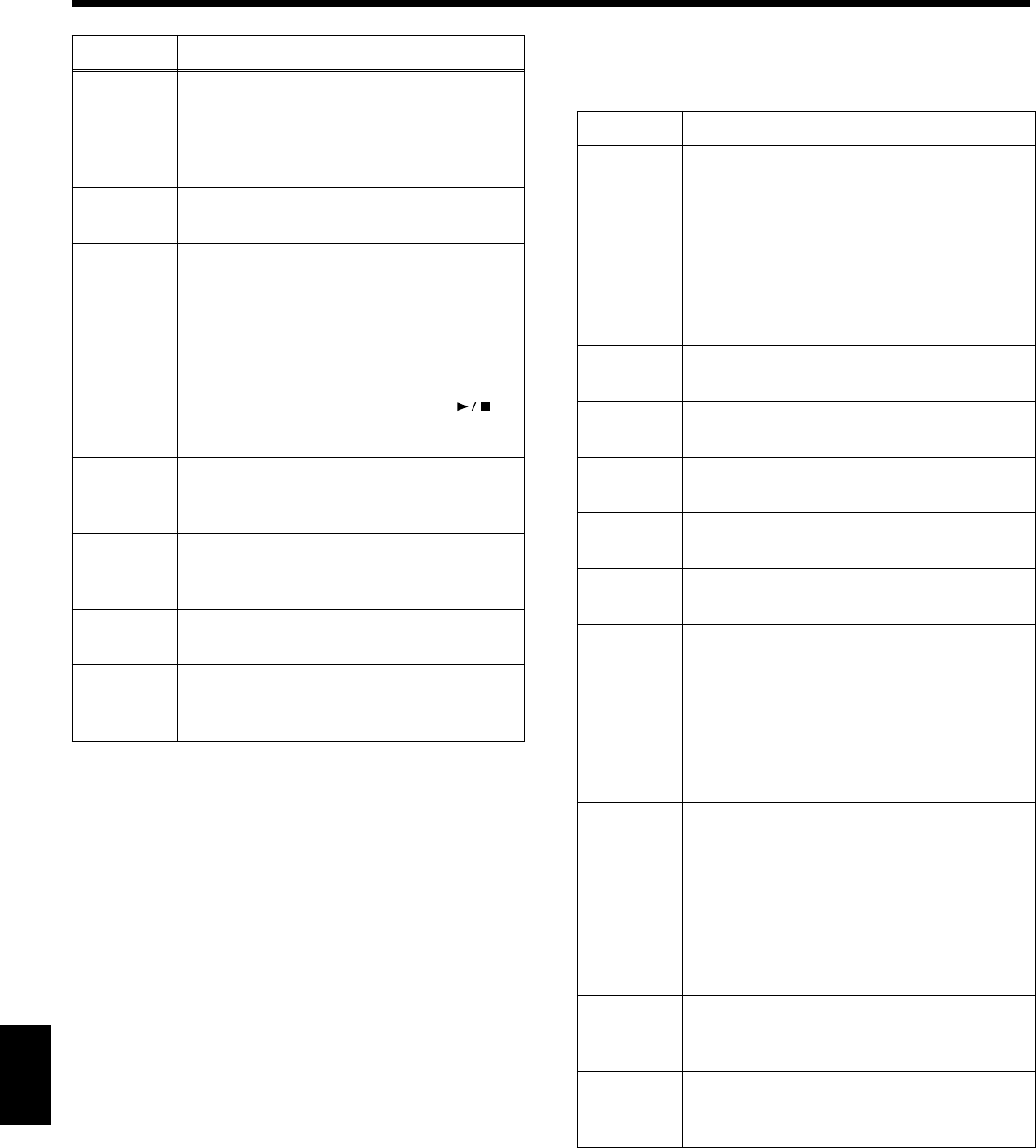
144
Chapter 8 Various Settings
Chapter 8
* What is the leading bass function?
The function that sounds the lowest note of a fingered chord
as the bass tone is called “Leading Bass.” When this function
is turned on, the Bass Tone changes when chord inversions
are used. Usually the tonic of the chord you play sounds as
the bass tone.
* What is the rotary effect?
This adds a sort of spinning effect to the organ sound, similar
to the sound when a rotary speaker is used.
Changing the speed increases or decreases the speed of this
spinning effect.
❍ Functions that can be assigned (Pedals
Only)
* The effect may not be applied correctly when you press a pedal
if “Pedal EX1–4” is assigned to more than one pedal.
→ Using the “Bend Up” or “Bend Down” function during a
split performance (p. 24) changes the pitch of sounds in the
right-hand side of the keyboard. Additionally, the range in
which the pitch can change when the Bender effect is used is
called the “bend range”; refer to “Changing the Bend Range
(Pedal Setting)” (p. 145).
Fade In/
Out
This starts Automatic Accompaniment with
a fade-in (where the volume gets progres-
sively louder), ends it with a fade-out
(where the volume gets progressively soft-
er), then stops.
Rotary
Slow/Fast
This switches the speed of the rotary effect*
when you perform with an organ Tone.
Glide
While the pedal or Performance Pad is held
down, the pitch of the sound drops tempo-
rarily, returning to the original pitch when
the pedal or Pad is released. This can be ef-
fective for simulating the performance of in-
struments like a Hawaiian guitar.
Compos-
er Start/
Stop
Performs the same function as the [
(Play/Stop)] button (p. 65).
Page
Fwd 1
Press the pedal or the Pad turns the score ap-
pearing on the display to the next page
while the performance of a song is stopped.
Page
Bwd 1
Press the pedal or the Pad turns the score ap-
pearing on the display to the preceding page
while the performance of a song is stopped.
Punch In/
Out
During Punch-in Recording, this starts and
stops recording (p. 119).
Tap
Tempo
You can set the tempo according to the inter-
val at which the pedal or pad is pressed
(p. 79).
Function Explanation
Function Explanation
Replay
Pressing the pedal during playback of a song
stops the playback. When the pedal is
released, playback resumes from the begin-
ning of the measure that was playing when
the pedal was pressed. When the pedal is
pressed in rapid succession, the playback
will resume backs up the same number of
measures as the number of times the pedal is
pressed.
Upper
Soft
The pedal functions as a soft pedal (p. 17).
Upper
Sostenuto
The pedal functions as a sostenuto pedal
(p. 17).
Lower
Damper
Applies a damper pedal effect to the sounds
in the left-hand side of the keyboard.
Bend Up
This raises the pitch of notes you play on the
keyboard.
Bend
Down
This lowers the pitch of notes you play on the
keyboard.
Pedal EX1
When the pedal is pressed during a layer per-
formance, the Tone volume changes between
two levels, depending on how firmly the
pedal is pressed.
Pressing the pedal with “Pedal EX1” selected
increases the layer Tone volume. The layer
Tone is played at a fixed volume, regardless
of how forcefully the keys are played.
Pedal EX2
Pressing the pedal with “Pedal EX2” selected
increases the layer Tone volume.
Pedal EX3
Pressing the pedal with “Pedal EX3” selected
increases the layer Tone volume, while the
volume of the left-hand Tone is decreased.
The layer Tone is played at a fixed volume,
regardless of how forcefully the keys are
played.
Pedal EX4
Pressing the pedal with “Pedal EX4” selected
increases the layer Tone volume, while the
volume of the right-hand Tone is decreased.
Expression
Overall volume level can be controlled.
A separately sold expression pedal (EV-5)
needs to be connected.


















